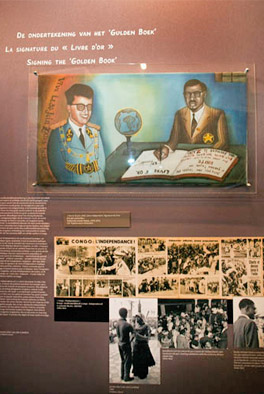INDEPENDENCE
|
|
Best wishes to the new Congolese state!
Patrice Lumumba, victorious in the May elections, is appointed to form a coalition government on 21 June. On 24 June, he wins the confidence of the House and Senate and is appointed Prime Minister. The independence act is a terse document: in only a few lines, it enacts the political transition but includes not a word on the transfer of economic resources. This elliptical piece of writing disappoints Congolese. Indeed, in the colonial era, the 'book' is an important symbol of power, and, in this case, the political transition has great symbolic impact. In popular depictions, power passes from King Baudouin, representing the colonial authority, to Patrice Lumumba, the prime minister elected by the majority of the Congolese people. But, in fact, signing the independence act involves the two prime ministers: Patrice Lumumba for Congo and Gaston Eyskens for Belgium. Over time in the Congolese imagination, the act becomes an imposing 'golden book': it remains the object of many myths in Congo. |




